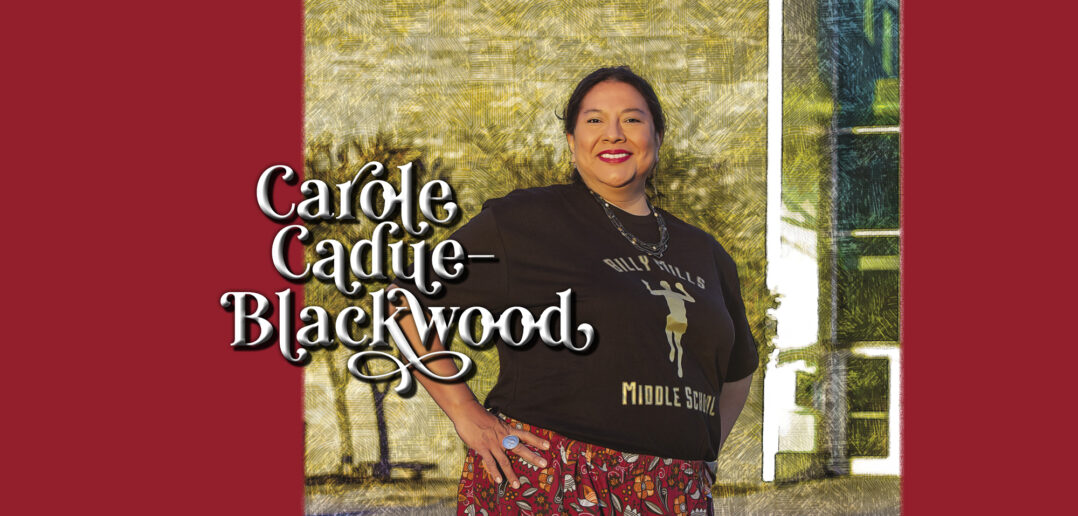| story by | |
| photo by | Steven Hertzog |
| OPEN A PDF OF THE ARTICLE |
A pillar of the Indigenous community and a strong advocate for her people, Carole Cadue-Blackwood continues to shed a light on the racism against Native Americans in all walks of life—from sports to schools to everyday life.

Carole Cadue-Blackwood: Woman of Impact
On a cool morning one recent Saturday, about 15 people showed up to a Kansas City Chiefs game to protest—peacefully—at the GEHA entrance of Arrowhead Stadium. Members and supporters of Not in Our Honor, formed in 2005 by a group of Native American college students at the University of Kansas (KU) and Haskell Indian Nations University, were there to raise awareness about how detrimental the use of Native Americans as mascots in sports is. The Chiefs happen to be the last NFL organization to choose not to change its mascot.
“I’m not going to stop until it changes,” says Carole Cadue-Blackwood, USD 497 Board of Education member, case manager for The Kansas City Indian Center and enrolled member of the Kickapoo Tribe in Kansas. “It’s dismantling structural racism. People aren’t aware of how harmful the use of Native American imagery is.”
This life that she has chosen—or that has chosen her—is one of activism, community outreach, service to her people, advocacy for youth and providing mental health services for all.
“She’s very justice-oriented,” explains Gaylene Crouser, executive director of the Kansas City Indian Center. “It all boils down to her people and being able to create positive social change for our community.”
In November 2022, a win for Not in Our Honor and Indigenous people alike, the Kansas Board of Education voted to retire using American Indians as mascots, helping to prevent “imagery and practices (to) seep into our publics schools,” Cadue-Blackwood says.
The Roots of Change
Cadue-Blackwood grew up in Lawrence. Her parents had moved the family here for the schools in 1978. She began her education at Sunset Hill Elementary in kindergarten and ultimately graduated from Lawrence High School in 1992. “I enjoyed the freedoms of being able to ride bikes with the neighborhood kids,” she says. “One of my favorite memories was when my parents came home from the grocery store to find us neighborhood kids playing kickball in the street.” She says her parents always encouraged their kids to get outside, and they never allowed them to say the “B” word (“bored”).
She spent many summers with her grandparents. From her grandmother, she learned “the concepts of mindfulness and the ability to examine my own biases while developing how to look through another person’s perspective,” she explains. “She (her grandmother) was highly intelligent, kind and fearless.”
From her grandfather, Cadue-Blackwood learned about discrimination, segregation and the power of words. She grew up seeing townsfolk call her grandfather “Chief” whenever they encountered him. She witnessed firsthand what he was forced to endure throughout his life (eating in the backs of restaurants and sitting on milk cartons around town) and what that kind of treatment can do to a person. This taught her how to be strong. She was called “Chief” once in high school, but only once. “I put a stop to that immediately,” she asserts.
She has always admired strong women, “my mother, my grandmothers and Wonder Woman. Specifically, in that order,” she quips. “All of them were committed to fighting the good fight while maintaining grace and compassion.”
Cadue-Blackwood met her husband, Dennis Blackwood, in the Intertribal Club at Lawrence High School when she was a junior and he was a senior. “It was during the ’90s when seven of our Indigenous men were being killed in a rash of violence or unsolved murders,” she relates. “I wasn’t able to concentrate in school and advocated and coordinated for members of our club to protest with members from The American Indian Movement (AIM),” a grassroots movement founded in 1968 to address issues related to racism and civil rights violations against Native Americans.
The couple has three adult children. “As an Indigenous woman, I was raised with the mindset of doing everything for future generations. I took my children everywhere with me as much as possible for advocacy efforts,” she says. Cadue-Blackwood credits her parents for taking her and her siblings to their workplaces, protests, lobbying and public meetings. “I try my best to model that same behavior for them (her kids).”
She credits her first job, as a cashier at Checker’s, for directing her career down the path it has since taken. “I now advocate for a living wage and am mindful of how the cost of climate change will affect the price of a loaf of bread or an increase in utilities. I am able to help the clients I serve maximize their resources to live with dignity.”
Cadue-Blackwood says the most challenging part of her life has been maintaining harmony in work and life. “Balancing child care, school, activism and marriage have all been challenging. I am fortunate to have found the love of my life early who supports me and vice versa,” she says. “He served our country, and now I feel like it’s my time to reciprocate.”
The Community “Auntie”
Cadue-Blackwood says advocating for others is her “self-care.” “I grew up in a household of change agents. I like a good challenge,” she says. “I’m able to measure moments that will influence future generations—my determination to see a dream or an idea become a reality.”
She is the first USD 497 board member to have attended Lawrence public schools, K through 12, and hold degrees from Haskell and KU (an associate’s degree from Haskell, a bachelor’s degree in political science and a master’s degree in social welfare with a clinical focus, both from KU). She serves on three site councils, the Budget and Program Evaluation Committee, Equity Advisory Committee and Educate Lawrence. “It’s my role (at USD 497) to serve as a link for the community; that means being accessible, looking out for students, keeping schools accountable for performance (and) ensuring the best education while working with reduced funding and supporting our superintendent,” she explains. “I also enjoy getting out and meeting our students. I want to hear from our most important stakeholders—our youth.”
Cadue-Blackwood works at The Kansas City Indian Center, one of only a few urban Indian centers in the country, which serves the Indigenous population of Kansas City and the greater surrounding area. “I love being a social worker,” she explains. “I have a dream job at The Kansas City Indian Center. I’m able to provide much-needed mental health services, performing community outreach and collaborating with other organizations to improve outcomes for urban Indigenous peoples.” She says she offers intensive outpatient services and facilitates a support group for those in recovery from addiction. “I want to improve access to mental health services and improve prevention services for our students. The pandemic showed just how much mental health services are now needed more than ever.”
But Crouser says Cadue-Blackwood does so much more at the Indian Center. “Carole wears so many hats,” she explains. Case manager, social worker, leader of after-care groups, counselor, policy and advocacy work, making connections and finding resources. More importantly, “The folks that come here look at her as an auntie. She’s just a really good auntie to the people in our community.”
In addition to her work with USD 497 and the Indian Center, she is also the liaison for the United States Attorney’s Office for the Western District of Missouri for Missing and Murdered Indigenous Peoples (MMIP). She advocated for the passage of Savanna’s Act, a bill that requires the Department of Justice to “review, revise and develop law enforcement and justice protocols to address missing or murdered Native Americans.” She was appointed by Gov. Laura Kelly to serve on the Juvenile Justice and Delinquency Prevention Committee to support local and state efforts to prevent delinquency and improve juvenile justice systems. “In 2019, Kansas Department of Corrections was transferring some inmates to an Arizona private prison to help alleviate overcrowding,” costing the state millions of dollars, Cadue-Blackwood explains. “I strongly believe that if we invested in our educational systems and improving access to mental health services, we could begin to see improved outcomes for our youth.”
She also is on the Douglas County Senior Services Board of Directors. She believes it’s important to include elders when working with students. “It’s imperative to incorporate the knowledge and experience of our elders to improve outcomes for our youth. The pandemic showed how isolation played a tremendous part of the need for mental health support for the world over.”
Years of Service
Over the years, Cadue-Blackwood has earned her fair share of accolades. In 2022, she was nominated by the YWCA Northeast Kansas as a Woman of Excellence for community contributions. In 2020, she was appointed by Kansas Gov. Laura Kelly to the Kansas Advisory Group on Juvenile Justice and Delinquency Prevention, was appointed to the Board of Directors for the Douglas County Senior Resource Center in Lawrence and was selected to be featured on the Lawrence Habitat for Humanity’s “Women Build” Calendar for outstanding women in the community. In 2019, she was a recipient of the Dr. Precious Porras Award for Campus Advocacy and Activism, and was recognized on the Kansas State Capitol statehouse floor for advocacy work for Indigenous peoples. In 2018, she was named to Lawrence Chamber of Commerce’s “Best Grassroots Initiative” for leading the Billy Mills Middle School rededication efforts and was the recipient of the National Indian Education of the Year Award for Advocating. In 2015, she received the United Way’s “William Wallace ‘Galluzzi’ Award” for Outstanding Volunteer.
“My combined town roots, experiential knowledge and education have given me the strength and knowledge to work with multiple systems from the macro to the micro level,” she explains.
Education and Inclusion
Cadue-Blackwood believes her hometown of Lawrence has great potential to become the mecca for Indigenous education. “I have matriculated my education in Lawrence. A diverse school community alone is not enough. We can continue to strive to create a truly inclusive community, one where students and adults are welcomed and supported. The work of inclusion is a responsibility held by all and done for all, person to person,” she explains.
She adds that we can do a better job toward inclusion of Indigenous people in the school curriculum while creating stronger partnerships with Haskell and KU. “Lawrence does a great job of honoring the uniqueness of each individual while embracing diverse backgrounds, values and points of view to … prepare students for lives in a multicultural society.” The best education, she believes, occurs in “a school comprised of students, teachers and families drawn from diverse socioeconomic backgrounds, cultures, races, religions and sexual orientations.”
A Legacy of Love
Cadue-Blackwood says her greatest achievement thus far is leading the name-change campaign for Billy Mills Middle School, in Lawrence, the first public school in America to be renamed after a Native American, let alone a living one. “It will stand as an example that we are still here, and Billy Mills will serve as role model for others to remember their dreams.”
“Sometimes it’s hard to know if you’re moving the needle at all,” the Indian Center’s Crouser says. “She (Cadue-Blackwood) will work hard and stick with it when things are not easy-coming, and she’s not going to give up. If it’s important and worth doing, she’ll keep after it. That’s (Billy Mills) gonna live on, something to be proud of, and it’s not some stereotype.”
To her family, friends and colleagues, she is an agent of change for her people and her community. “Her goal is to uplift the Native American community and provide and educate all kids, not just Native kids,” she continues. “She wants to make sure we’re really being seen in a way that reflects who we are as an Indigenous people.”
Cadue-Blackwood says she’d like to continue her advocacy efforts into the future. “I would like to see myself at a ribbon cutting for a new school instead of searching for ways to maximize our underfunded schools,” she says. Ultimately, “I am able to sleep with a clear conscious. I feel that when I go into the next world, I can tell my ancestors I did the best I could to help.”




